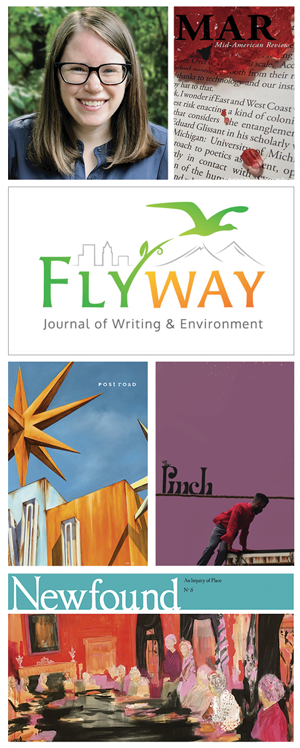After moving to a small Norwegian village on the edge of continental Europe’s largest glacier, Beth Peterson began writing the essays that would become her debut collection, Dispatches From the End of Ice (Trinity University Press, November 2019). “I felt like I’d fallen into that place like a home, like I’d always lived there: cascading waterfalls, aqua-blue fjords, the seemingly endless expanse of glacial ice, even the quiet village life,” says Peterson. As the town changed—cruise ships arrived, ice melted—she felt compelled to write about it. “Where there was once ice, a pond appeared, then a lake,” she says. “I wanted to articulate this important, disappearing thing.” Peterson’s environmental consciousness and sense of place is reflected in the journals that published essays from her book, including the five below.

Peterson says she seeks out journals in which literary conversations “seem to be happening with the most candor and thoughtfulness.” She found this kind of dialogue in the online journal Flyway, which published “Theory of World Ice,” her essay about visiting the Jostedal Glacier in Norway. Edited at Iowa State University, Flyway publishes poetry, fiction, nonfiction, and visual art dedicated to the intersection of writing and the environment. Its editors are passionate about how art can humanize the conversation about the changing earth. “We can’t talk about the environment without talking, in some way, about climate change,” says managing editor Eric Williams. “But the conversation about climate change has been increasingly polarized, reduced into a constricting binary of believers and nonbelievers…. Art, and specifically storytelling, has the unique ability to bridge the communication gap when it comes to the environment.” Submissions in all genres will open via Submittable on January 15.
Peterson structures her essays—which combine personal narration, reportage, and description—in creative ways. (“Structure is always saying something,” she says.) Her essay “To the Center” jump-cuts between close reads of Jules Verne’s Journey to the Center of the Earth and narration of a summer Peterson spent in Wyoming. Peterson found a home for the piece in Post Road, which she values for its willingness to push traditional formal boundaries. Peter Hausler, the journal’s nonfiction editor, was in turn drawn to “her poet’s eye for detail, as she expertly moves her ever-observant lens in close and then pulls back at just the right moments.” The biannual print journal publishes poetry, fiction, nonfiction, art, plays, criticism, and a Recommendations section through which writers consider their favorite books from any angle they choose. Post Road will be open for submissions in all genres on February 1.
When she first encountered the online journal Newfound, Peterson “voraciously read much of the journal’s work” and just a few months later submitted “Lost: An Inventory” to the biannual, which published it in spring 2018. Edited in Austin, Texas, Newfound explores how “place shapes identity, imagination, and understanding.” The latest issue includes Ashley Anderson’s essay about her neighbor in Ohio who tended the county’s beehives and Krishna Mohan Mishra’s story about three boys riding a train between India and Nepal. Submissions in poetry, fiction, nonfiction, and art are open via Submittable until May 15; contributors are paid $25 per piece.
“I wasn’t sure what sort of journal might pick up a piece about a long-dead Austrian philosopher,” says Peterson of her essay about searching for Ludwig Wittgenstein’s cabin. “I realized I needed to find one that had an international scope and also that wasn’t scared off by a more intellectual essay.” Mid-American Review, a print biannual edited at Bowling Green State University, fit the bill. Established in 1972, Mid-American Review has grown from a journal of work by the university’s mfa alumni to an international publication of poetry, fiction, nonfiction, criticism, and translation. “Our fiction tends to be quirky and our poetry tends toward the lyrical,” says editor in chief Abigail Cloud. The editors accept submissions in all genres year-round via the journal’s online submission manager.
Peterson published “The Speed of Falling”—which weaves together the story of a friend who died of a fall on a hike with descriptions of Galileo’s work on motion—in the Pinch, a print biannual housed at the University of Memphis that she praises for its “sharp and committed student editors.” Editor in chief and university faculty member Courtney Miller Santos strives to empower students to “find transgressive, authentic, and prescient work.” The Pinch pulls more than 80 percent of its work from the slush pile and mostly publishes the work of emerging writers. Submissions in poetry, fiction, nonfiction, and art are open year-round; the journal’s new $1,000 Page Prize in Nonfiction opens on January 1 with a $10 entry fee per submission.
Dana Isokawa is the senior editor of Poets & Writers Magazine.








